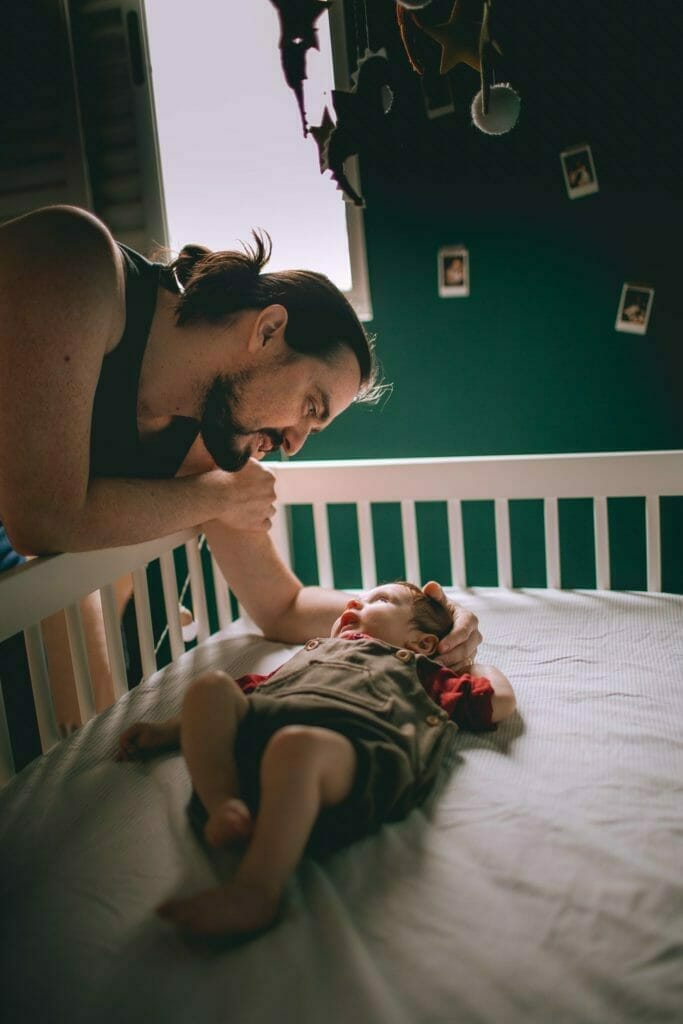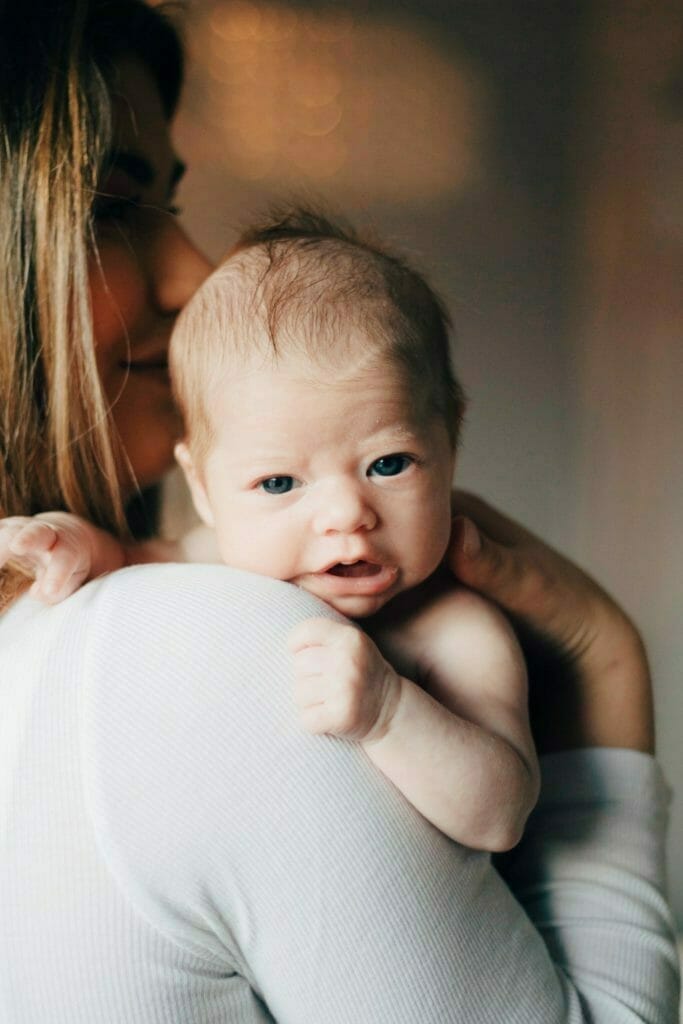What is Elterngeld?
Parental benefit supports parents who work less or not at all after birth to care for their child. Parental allowance is available for all mothers and fathers. With parental allowance, you can work up to 32 hours per week, and it is also possible that you are not employed at all. You do not have to interrupt your studies or training to receive a parental benefit, and you can apply for it either alone or with the other parent.
Parental benefit is available in three variants:
- Basiselterngeld
- ElterngeldPlus
- Partnerschaftsbonus
If only one parent applies, basic parental allowance is paid for at least two months and up to twelve months of your child’s life. If you both request parental benefit, you can receive 14 months together. If the child was born at least six weeks early, you can get a parental benefit for longer. Depending on how early your child was born, you can get up to 18 months of parental benefit. You are free to divide the parental allowance months amongst yourselves. You can receive the necessary amount together, consecutively, or alternately. You also receive an additional two months if you are a single parent.
Essential parental benefit is between 300 and 1800 euros per month, depending on your income before your child’s birth. In most cases, it is 65 percent of your net income, and parents with low incomes receive up to 100 percent of their net income. If you are employed part-time, it will affect the amount of your parental allowance. Your income after the birth is taken into account. You can receive the minimum amount if you had no income before delivery. You may receive higher amounts if you have other young children or twins. It is a misdemeanor to intentionally or negligently fail to make a notification or to make a notification incorrectly, incompletely, or untimely. The administrative offense may be punished by a fine of up to two thousand euros.

Can I get a parental allowance?
As a parent, you can receive parental allowance under the following conditions:
- You care for and raise your child yourself
- You live with your child in a shared household, and you live in Germany
- You do not work at all or only up to 32 hours per week
- Foreign parents must meet additional requirements
Can we also apply for parental allowance as grandparents or other relatives?
You can receive a parental allowance:
- For your biological child,
- For the natural child of your wife or husband, your life partner,
- For your adopted child, even if the adoption procedure is still ongoing (so-called “adoption care”),
- In exceptional cases, also for your grandchild or great-grandchild, niece or nephew, sister or brother. It is possible, for example, if the child’s parents are seriously ill, disabled, or have died.
The parental allowance does not depend on your employment relationship
Parental allowance is available for:
- employees
- civil servants
- Self-employed persons
- Unemployed persons
- students and trainees
- Homemakers
- Part-time workers
- Part-time workers (mini-job)
- Self-employed and non-self-employed workers
- Working abroad
You can also receive a parental allowance if you did not work before your child’s birth. And it’s also possible to receive a parental allowance if you receive other benefits. Calculate your parental benefits.

How much parental benefit can I get?
The amount of your parental allowance depends on the following questions:
- Are you applying for Basiselterngeld or ElterngeldPlus or Partnerschaftsbonus?
- How much income have you had so far?
- How much income will you have while receiving a parental allowance?
- Do you receive any other government benefits?
- Are you having twins or more multiples?
- Do you already have other young children?
- Depending on your income
Basic parental allowance is between 300 and 1,800 euros per month and ElterngeldPlus between 150 and 900 euros per month. If you have more than one child, you can receive supplements, for example, for twins or older siblings.
You can also receive the minimum amount of 300 euros basic parental allowance or 150 euros parental allowance plus if you have had no income.
You will also receive the minimum amount, for example, if you earn the same amount after the birth as before. You can calculate the amount of the parental allowance in your case without obligation using our parental allowance calculator.
Amount of basic parental allowance
As a basic parental allowance, you usually receive 65% of the net income you had before the before of your child birth. This means:
- When you have no income after the delivery, you will receive the basic parental benefit of 65% of your net income before birth.
- If you continue to earn money after the delivery, the basic parental benefit is 65% of the difference between your net income before birth and your net income after.
- A maximum of 2,770 euros is considered as net income before birth. That means, if you earned more, it will not be considered.

More parental allowance for low-income earners
You would receive more parental allowance if you had a net income of fewer than 1,240 euros before your child’s birth. The percentage you receive of your income difference as parental allowance then increases.
The less net income you had, the larger the share:
- Suppose you had between 1,240 and 1,200 euros, the percentage increases in small steps from 65% to 67%.
- At 1,238 euros, you get 65.1%, at 1,236 euros, you get 65.2%, and so on. If you had between 1,200 euros and 1,000 euros, you get 67%.
- If you had less than 1,000 euros, the percentage increases again in small steps to 100%.
- For every 2 euros that your income was below 1,000 euros, the percentage increases by 0.1%. At 998 euros, you get 67.1%, at 996 euros, you get 67.2%, and so on.
You will receive the minimum parental allowance, even if you have no income. How high the parental allowance could be in your case can be calculated without obligation by our parental allowance calculator.

Amount of ElterngeldPlus and partnership bonus
ElterngeldPlus is calculated in the same way as the basic parental allowance. However, ElterngeldPlus is limited to half of what you would theoretically receive as a basic parental allowance if you had no income after the birth.
This limit is called the “capped amount.” You can receive ElterngeldPlus for twice as long as your basic parental allowance, and ElterngeldPlus is always half the amount of your basic parental allowance if you have no income after birth.
Therefore, you can opt for ElterngeldPlus, for example, to extend the period in which you receive the parental allowance. Your parental allowance will not be less overall but spread over a more extended period. ElterngeldPlus can be particularly worthwhile if you have income after birth because you work part-time.
In that case, ElterngeldPlus may be just as high as the basic parental allowance with payment. Nevertheless, you can receive ElterngeldPlus twice as long as your basic parental allowance, and the partnership bonus is calculated similarly to ElterngeldPlus.

Do I have to take parental leave to receive a parental allowance?
You do not necessarily have to take parental leave to receive the parental allowance. However, you may not work more than 32 hours per week as long as you receive a parental allowance. Many employees, therefore, have to reduce their working hours to receive a parental allowance and use parental leave to do so.
Tip: Plan your parental leave so that you receive the parental allowance for the entire duration of your parental leave.
What is parental leave?
Parental leave is an unpaid break from working life for mothers and fathers who care for and raise their children. As a team member, you can request parental leave from your employer. Your employer must release you from work for up to 3 years per child during parental leave. You do not have to work and do not receive a salary during this time. To compensate, you can apply for parental allowance, for example. The paternity leave in other countries is covered in Germany by the regulations on parental leave and parental allowance.
You can take your parental leave before your child’s 3rd birthday, and you can also take part in it between the 3rd and the 8th birthday. You can take your parental leave when you and your child need it. During parental leave, you are uniquely protected from dismissal. After parental leave, you can return to your old job in most cases.
Who can take parental leave?
You can take parental leave under the following conditions:
- You are a team member.
- You live with your child in a shared household, and you care for and raise your child yourself.
- During parental leave, you either do not work or work a maximum of 30 hours per week. You can find out more about this topic under Working part-time during parental leave.
- Parental leave is possible in any employment relationship.
- You can take parental leave in any employment relationship, including, for example, part-time, fixed-term contracts, so-called “mini-jobs,” or if you work from home.
If you are studying and working simultaneously, you can also apply for parental leave, for example, if you are undergoing training or retraining or employed for further professional training. You are entitled to parental leave if you work in Germany or if your employment contract was concluded under German law, and it does not matter whether you live in Germany.

You are entitled to parental leave regardless of whether the other parent also claims parental leave
You can get parental leave:
- for your biological child
- for the natural child of your wife or husband, or of your civil partner
- for a foster child in full-time care
- for your adopted child, even if the adoption proceedings are still ongoing (so-called “child in adoption care”),
- For your grandchild, if one of the child’s parents is a minor or is in education that they started before their 18th birthday, in both cases, you can only get parental leave if both of the child’s parents do not take parental leave themselves. In the case of births before June 1, 2015, this is not possible during any part of the training, but only during the last two years of training,
- In exceptional cases for your sister or brother, niece or nephew, grandchild or great-grandchild. It is possible, for example, in case of serious illness, disability, or death of the parents.
If you do not have custody of the child, you need the custodial parent’s consent to take parental leave.

Who is not entitled to parental leave?
Persons not in employment are not entitled to parental leave. These individuals do not have an employer from whom you can request time off from work, and they also do not have to be protected from dismissal.
Therefore, the following groups of people cannot get parental leave:
- Self-employed persons,
- Managing directors or self-employed partners of partnerships or corporations,
- homemakers,
- students,
- school pupils,
- participants in the Voluntary Social Year (FSJ), Voluntary Ecological Year (FÖJ), and Federal Volunteer Service (BFD),
- the unemployed and
- volunteers.
- Parental leave is regulated in the Federal Parental Leave Act (BEEG): Law on Parental Allowance and Parental Leave.
The parental benefit and residence abroad?
As a parent, you are only entitled to a parental benefit if your place of residence or habitual abode is in Germany. You cannot emigrate and move your center of life to another country and continue to receive a parental allowance simultaneously. The only exceptions are cross-border commuters and expatriates, discussed below.
The parental leave and residence abroad?
Stay abroad during parental leave. You do not have to live or stay in Germany during parental leave, and the only requirement is that your child lives with you and that you have an employment contract under German law or are under contract with a German employer. Some parents use parental leave for travel or a more extended stay abroad – that is no problem. However, you are not entitled to the parental benefit payments in this case.
Parental allowance for cross-border commuters
According to European law, since the parental benefit is a family benefit, there are advantages for cross-border commuters. In the best case, they are entitled to family benefits from both countries. The country of employment principle applies: The country where you work is primarily responsible for family benefits.
Cross-border commuters are divided into two categories:

You work in Germany but live in another EU country.
If you work in Germany but live in another EU state, you are a cross-border commuter entitled to parental benefits.
You live in Germany but work in another EU country.
Of course, this rule also applies the other way around: If you live in Germany but work in another EU country, you are entitled to that country’s family and social benefits. In such a case, the responsible family benefits office checks whether you would, in principle, be entitled to a higher parental allowance rate and, in the best case, even approves different amounts. Depending on the country where you are socially insured and how much parental benefit you receive, you will have to pay tax on it in the other EU country.
Parental benefit for parents who are both cross-border commuters
If you both live in Germany but work in a neighboring country (e.g., the Netherlands, Czech Republic, Switzerland, France, or Austria), the country of employment principle usually applies. So the country where you work is responsible for your family benefits. However, there is a new ruling for the particular case that both parents are cross-border commuters: You can choose which country you want to receive family benefits like a parental allowance.
Who else is entitled to parental benefit during the stay abroad?
Some people work abroad and are still entitled to German parental benefits.
These include:
- Self-employed people who live abroad for a project or a limited time
- Development workers
- Missionaries
- Civil servants who have been assigned to work abroad in accordance with §123a of the Civil Servant Law Framework Act (Beamtenrechtsrahmengesetz)
- German employees of an inter- or supranational institution (e.g., NATO, UNO, or EU)
- Employees who are sent abroad in the context of a German employment relationship
How to cancel your parental benefit
It is very straightforward to cancel your parental benefit. In most cases, you can call the family benefits office in charge of you and tell them that the payments must stop, and you’ll need to provide your case number and personal details as proof of being you. If you want to take care of the matter via Mail, you can write a letter stating your situation and request to discontinue the payments. Here you will also need to provide proof of who you are. For example, you can scan your ID card and the original document sent to you from the parental allowance office when you first applied for it. In some offices, it mightn’t be as simple, though. Sometimes you must provide certain documents as your deregistration confirmation. If you would like assistance because you don’t speak German, you can book one of deregistraion.de’s convenient packages, and we’ll take care of it for you!
Deregistraion.de parental benefit cancellation Service
If you need help with your parental benefit cancellation we’re glad to be of service. With our help, you can make sure the cancellation is completed in an orderly manner. You won’t need to speak German at all. You can complete your part completely online, from any place in the world.
We will require the original document sent to you from the parental benefit office when you first applied, a copy of your ID card/ and, or your Passport, your deregistration confirmation, and a signed power of attorney (we provide you with one after your booking). We will write your request for termination of payments and send everything via registered Mail and provide a tracking code for you, so you can see it has arrived.
Please keep in mind that we do our best to provide credible and up-to-date information, but we are not an official advisor (in the sense of the Legal Services Act, RDG) for taxes, legal matters, and the like. Our service does not replace an individual consultation with legal assistance, and we provide digital tools and automated workflows to assist with the residence deregistration and related necessary steps.
Image sources:
- Kelly Sikkema / Unsplash
- Kelly Sikkema / Unsplash
- Jonathan Borba / Unsplash
- Carlo Navarro / Unsplash
- Isaac Quesada / Unsplash
- Hollie Santos / Unsplash
- Nathon Dumlao / Unsplash
- Helena Lopes / Unsplash


